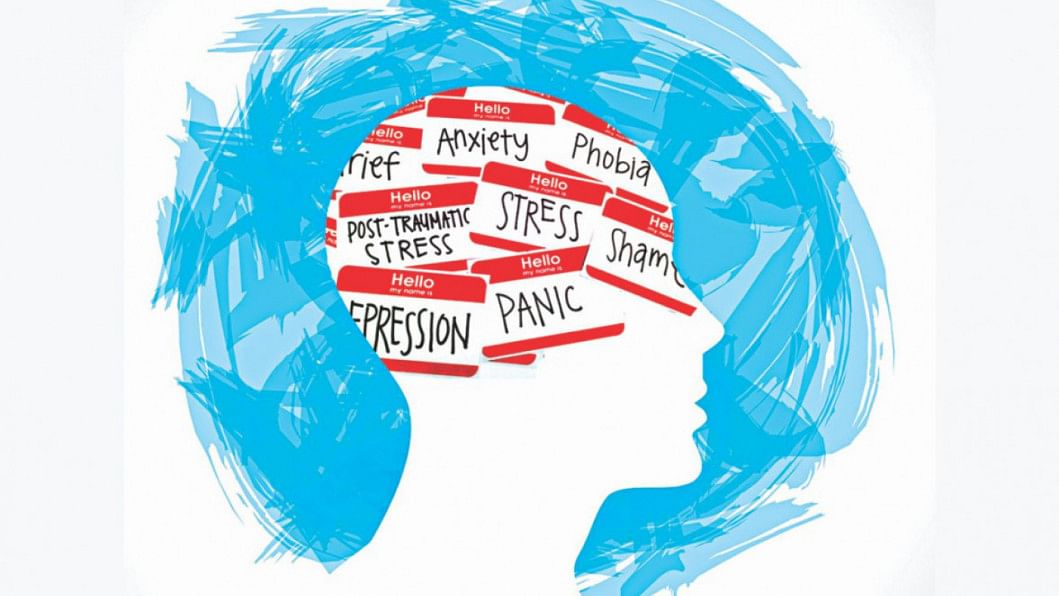Conversation about youth mental health must evolve

"Mental illnesses did not exist in our time, why do you struggle with so many mental health issues?"- A father asked his teenage daughter. Talking to the 10th-grader, I discovered that her sister was struggling with depression, but their father was not seeking treatment. He was unaware of the fact that adolescents can suffer from mental illness. Even after learning that one of her classmates committed suicide due to parental scolding over exam results, the father remained unmoved.
In Bangladesh, 361 students, a significant percentage of whom were elementary students, succumbed to suicide between January and August in 2023. According to a study conducted by Aachol Foundation, mental illness, particularly among the youth, has become a silent pandemic, which is often aggravated by social stigma and misapprehension surrounding the condition. Countless parents remain either unaware or in denial regarding their children's mental health issues. This attitude represents a grave challenge that cripples our ability to address this growing crisis.
The World Health Organization (WHO) defines health as not merely the absence of physical ailments, but as a combination of physical, mental, and social well-being. Mental health is our ability to manage emotions, face societal challenges, and live without fear or frustration. It is equally important as physical health. A 2018 survey conducted by the National Institute of Mental Health of Bangladesh states that the rate of mental illness among individuals aged 18 years and above is 18.7 percent in the country. WHO states that more than half of mental health issues take root before 14 years of age, while suicide is deemed the second leading cause of death between ages 15 and 29, globally. Yet, mental health issues are often the most overlooked.
Mental health is also included in the Sustainable Development Goals (SDGs), a recognition of its significance in achieving global development goals. Despite this, misconceptions about mental illness proliferate Bangladesh. Those who suffer are frequently ridiculed, ostracised, and even feared. This stigma prevents individuals from seeking help and further compounds their suffering. Children are vulnerable beings, living in a society that places tremendous academic pressure on them while providing little in the way of healthy recreation outlets.
As society grows increasingly competitive, the older generations cannot imagine the level of stress faced by the youth today. Most adolescents experience stress with the onset of puberty, facing academic, peer and social pressures, which are at times coupled with major changes such as changing schools, separation of parents, chronic illness, financial issues, etc. While small amounts of stress can be beneficial as it motivates them to excel in high-pressure situations, it is when stress spirals out of control that it negatively impacts our mental and physical well-being.
According to the US National Institute of Mental Health, if a child attempts to harm themselves or others, they should seek immediate psychiatric help. If guardians become aware of such propensities, it is important to arrange treatment at the correct time. In young children, the following symptoms should be checked by a psychiatrist for examination and diagnosis: if a child has overt anger issues or is severely irritable most of the time; often speaks of fear or anxiety; complains of repeated stomach aches or headaches for no reason; is generally restless; sleeps too much or too little, has nightmares; is disinterested in playing with or making friends with other children; gets bad grades in exams suddenly, etc.
Psychiatric help should be sought for adolescents if they lose interest in things they used to enjoy, feel physically weak, sleep too much or are drowsy throughout the day, become socially avoidant, are afraid of gaining weight and/or eating too little, harm themselves, smoke, drink or abuse drugs excessively, engage in risky or aggressive behaviour alone or with friends, have suicidal thoughts, and/or are paranoid or have hallucinations.
Some parents and guardians lament that had they been better educated and aware, they could have sought treatment earlier for mental health issues as they can be managed through proper care and support. That is why it is important to seek professional support at the earliest. We hesitate to consult mental health professionals due to fear of social stigma. This must change.
The conversation about mental health needs to shift—now. The notion that mental illness is a personal flaw must be eradicated. Our children are not immune to the struggles of mental illness, and they deserve empathy, understanding, and above all, access to appropriate medical care. Public awareness campaigns are essential in dispelling the myths surrounding mental health. It's high time we prioritised mental well-being as part of our overall health framework. After all, a healthy society is one where the mind is cared for just as much as the body.
Laila Khondkar is an international development worker.
Views expressed in this article are the author's own.
Follow The Daily Star Opinion on Facebook for the latest opinions, commentaries and analyses by experts and professionals. To contribute your article or letter to The Daily Star Opinion, see our guidelines for submission.


 For all latest news, follow The Daily Star's Google News channel.
For all latest news, follow The Daily Star's Google News channel. 









Comments